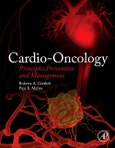Cardio-Oncology: Principles, Prevention and Management is a clinical volume that focuses on the basic science of cardio-oncology, addresses cardiotoxicity as a consequence of cancer therapy, and discusses prevention, diagnosis and management of cardiovascular disease in patients with cancer.
This comprehensive volume presents unique perspectives ranging from basic science to clinical medicine in the field of cardio-oncology. It would be a valuable resource for cardiologists, oncologists, internists, and pediatricians caring for patients with cancer who have cardiovascular risk factors, as well as for cardio-oncology researchers.
Please Note: This is an On Demand product, delivery may take up to 11 working days after payment has been received.
Table of Contents
Basic Concepts 1. Current trends in cancer therapy Monica Mita 2. Molecular Mechanisms Underlying Anthracycline Cardiotoxicity:Challenges in Cardio-Oncology Lorrie Kirshenbaum 3. Chemotherapy and cardiovascular biology Paul A. Cahill 4. Anthracyclines Edward T H Yeh and Rohit Moudgil 5. Kinase inhibitors, ErbBs, VEGF Antonio RussoRecognition and Management 6. Role of novel imaging techniques in detection of chemotoxicity: cardiac MRI and nuclear Louise Elizabeth Jane Thomson 7. Role of biomarkers in detecting cardiotoxicity (highly sensitive troponin, BNP) Daniela Cardinale 8. Ischemic heart disease as a consequence of cancer therapy Joseph Carver 9. Radiation and vascular complications (thrombosis, carotid atherosclerosis for head/neck cancer, Hodgkin's lymphoma) [include valve and pericardium] Stephen Shiao 10. Identification of at-risk patients and comorbidities that increase risk Tochukwu Okwuosa 11. Special considerations in pediatric patients and survivors of childhood cancer Steven Lipshultz and Vivian Franco 12. Special considerations of pre-mature menopause in women as a consequence of chemotherapy Chrisandra Shufelt 13. Cancer and Exercise Ahmed Al Badri 14. Statin usage in cardio-oncology patients Susmita Parashar 15. Coordinating cardio-oncology care Susan Dent 16. Role of coronary calcium, hs-CRP, ABI Janet Wei 17. Hypertension and cancer Antoine Hage 18. Pulmonary Hypertension and Cancer Antoine Hage 19. Detection of Cardiotoxicity by Echocardiography Stamatios Lerakis 20. Cancer fatigue/chemo brain, rehabilitation and quality of life Arash Asher
Managing the patient in advanced HF 21. Management of advanced HF and transplant considerations in cancer patients Michele A. Hamilton 22. Heart transplant and LVADs in cancer survivors (role of immunosuppression in transplant patients) Michelle M. Kittleson 23. QT prolongation, EP Devices to support the failing heart (ICDs, BiVs, Pacemakers) Mikhael El-Chami
Authors
Roberta A. Gottlieb Professor of Medicine, Director of Molecular Cardiobiology, Dorothy and E. Phillip Lyon Chair in Molecular Cardiology, Cedars-Sinai Heart Institute,Barbra Streisand Women's Heart Center.
Dr. Gottlieb has been conducting NIH-funded cardiovascular research for the past 20 years. She has prior experience with The Scripps Research Institute (TSRI); SDSU where she became the first Director of the Donald P. Shiley BioScience Center, and currently as the Director of Molecular Cardiobiology at Cedars-Sinai Heart Institute.
The work in her lab has led to the discovery of the cardioprotective agents and the elucidation of their novel mechanism of action. Her expertise in cardioprotection and autophagy is recognized on a national and international level.
Dr. Gottlieb is also an entrepreneur, having started a biotechnology company called Radical Therapeutix, to develop drugs to mitigate the damage to the heart during myocardial infarction. Dr. Gottlieb received her B.S. and M.D. degrees from Johns Hopkins University.
Puja K Mehta Emory Clinical Cardiovascular Research Institute.
Dr. Mehta, MD, FACC is Director of the Non-invasive Vascular Function Research Laboratory in the Barbra Streisand Women's Heart Center at the Cedars-Sinai's Heart Institute. She is also Co-Director of the Cardio-Oncology Program, a clinic dedicated to the heart health of women after cancer treatment.
Dr. Mehta is board certified in internal medicine and cardiovascular diseases and board-eligible in echocardiography and nuclear cardiology. She is a member of the American Heart Association, the American Society for Preventive Cardiology and the American College of Cardiology, where she is also a fellow. In addition to academic success, she has received numerous awards including the prestigious New Jersey Foundation Humanism in Medicine Award. She has published her research in peer-reviewed journals and presented at national cardiology meetings. Dr. Mehta's research is National Institutes of Health (NIH) funded and includes the role of mental stress in heart disease, exploring the brain-heart connection and new approaches to treating chest pain in women.
Dr. Mehta's Scival Overall Research Performance 2009-2013: 30 Publications, 245 Citations, 1.64 Field-Weighted Citation Impact, 8.2 Citations per Publication
The editors state that "We will probably enlist 2-3 more editors in order to balance the perspective, probably Melissa Hudson (oncologist) and Javid Mohslehi? and "a hypertension expert (possibly Ron Victor)? as a result of the reviewer feedback.








